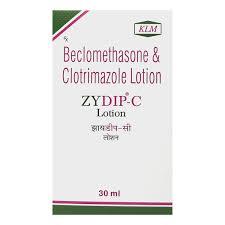BECLOMETHASONE + CLOTRIMAZOLE
Beclomethasone: Beclomethasone is a medication that belongs to the class of drugs called corticosteroids. It is commonly used in the management of various respiratory conditions, including asthma, chronic obstructive pulmonary disease (COPD), and allergic rhinitis.
The drug works by reducing inflammation in the airways, which helps to relieve symptoms such as wheezing, coughing, and shortness of breath. Beclomethasone exerts its anti-inflammatory effects by binding to specific receptors in the cells and blocking the action of certain chemicals that cause inflammation.
Beclomethasone is available in different forms, including inhalers and nasal sprays. The recommended dose and frequency of use can vary depending on the specific condition being treated and the severity of symptoms. It is important to follow the instructions provided by the healthcare professional or the product labeling.
Although beclomethasone is generally well-tolerated, it can cause certain side effects. Common side effects of beclomethasone inhalers may include throat irritation, hoarseness, cough, and fungal infections in the mouth or throat (thrush). These can be minimized by rinsing the mouth after each use. Rare but more serious side effects may include adrenal suppression, reduced bone mineral density, and growth retardation in children.
When using beclomethasone nasal sprays, common side effects include nasal irritation, nasal bleeding, and headache. In some cases, it may also cause systemic effects such as adrenal suppression, especially when used at high doses for prolonged periods.
It is important to note that beclomethasone should be used regularly and as prescribed by the healthcare professional. Abruptly stopping the medication or using it inconsistently may result in worsening of symptoms and may not adequately control the underlying condition.
As with any medication, it is recommended to consult a healthcare professional for complete and personalized information about the use of beclomethasone, including dosing, potential interactions with other drugs, and monitoring for side effects.
Clotrimazole: Clotrimazole is an antifungal medication used to treat various fungal infections. It belongs to the azole class of drugs and is available in various forms such as cream, lotion, powder, and oral lozenge.
Clotrimazole works by inhibiting the synthesis of ergosterol, a crucial component of fungal cell membranes. Without ergosterol, the fungal cell membrane becomes weakened, leading to cell death and the elimination of the infection.
The dose and duration of treatment with clotrimazole can vary depending on the type and severity of the infection. For most common fungal infections, clotrimazole cream is applied to the affected area twice daily until symptoms improve, usually for 2 to 4 weeks.
Common side effects of clotrimazole include mild skin irritation, redness, itching, and burning sensation at the application site. These side effects are usually temporary and resolve on their own. However, if they persist or worsen, it is advisable to consult a healthcare professional.
In rare cases, clotrimazole can cause more serious side effects such as allergic reactions including rash, hives, difficulty breathing, and swelling of the face, lips, tongue, or throat. If any of these occur, immediate medical attention is required.
Clotrimazole is generally considered safe for most individuals, but it is important to consult a healthcare professional before using it, particularly if pregnant, breastfeeding, or have a history of allergic reactions to similar medications. Additionally, it is essential to follow the prescribed dosage and duration of treatment to ensure effective and safe use of the medication.


